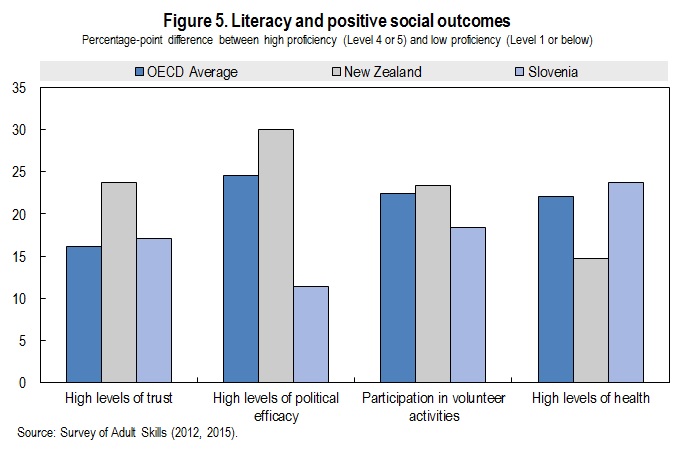By Paulina Granados Zambrano.
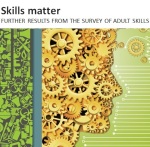 The recently published Second International Report for the Survey of Adults Skills, Skills Matter: Further Results from the Survey of Adult Skills, looks in detail at the extent to which proficiency in literacy, numeracy and problem solving in technology-rich environments matters for the well-being of individuals and nations. The answer that emerges is clear: proficiency is positively linked to a number of important economic and social outcomes.
The recently published Second International Report for the Survey of Adults Skills, Skills Matter: Further Results from the Survey of Adult Skills, looks in detail at the extent to which proficiency in literacy, numeracy and problem solving in technology-rich environments matters for the well-being of individuals and nations. The answer that emerges is clear: proficiency is positively linked to a number of important economic and social outcomes.
The Survey of Adults Skills (PIAAC) is an international assessment of the proficiency of adults aged 16-65 years in three key information processing skills: literacy, numeracy, and problem solving in technology-rich environments. The first results from the survey were released in October 2013 (OECD, 2013) and covered 25 countries and sub-national entities while the last report covers a further nine – Chile, Greece, Indonesia (Jakarta), Israel, Lithuania, New Zealand, Singapore, Slovenia and Turkey. For these countries and sub-national entities, data was collected in 2014-15.
Labour market outcomes: Employability and wages
The new report (specifically, chapter 5) shows that, in most countries, proficiency in information-processing skills is positively associated with the probability of being employed and earning higher wages. In practically all countries, proficiency in literacy is valued independently of educational qualifications or experience.
After taking educational attainment into account, a one standard deviation increase in an individual’s literacy proficiency (equivalent to 48 score points) is associated with a 0.8 percentage-point increase in the likelihood of being employed as opposed to being unemployed (Figure 1).
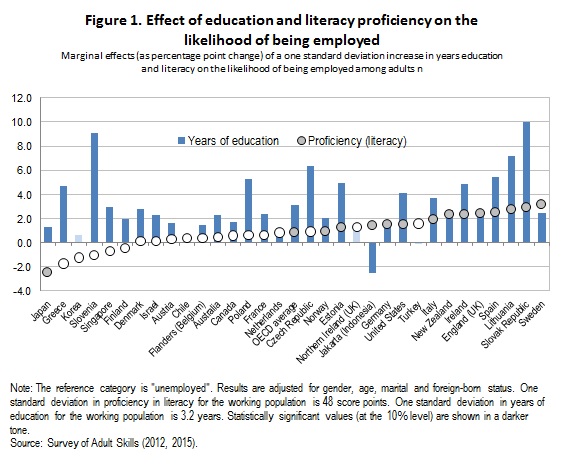
Jakarta (Indonesia), Turkey and New Zealand are the only countries/economies participating in the second round of PIAAC where proficiency in literacy is at least as important as years of education in increasing the probability of being employed. In Greece, Slovenia, Singapore, Israel and Lithuania education matters the most. In Chile, neither education nor proficiency in literacy seems to impact the likelihood of being employed, whereas in Indonesia (Jakarta) education even has a negative effect (after controlling for the effect of proficiency). A possible explanation for the latter could rely on unemployed youth, that accounts for over 50 per cent of the unemployed population in Indonesia. Work experience plays a large role for labour market outcomes in Indonesia, and most of unemployed youth, in fact better educated than older generations, have never worked before.
For salaried employees, a one standard deviation increase in literacy proficiency is associated with a 6% increase in hourly wages on average across OECD countries/economies (Figure 2). The use of skills is even more important, as a one-standard deviation increase in reading use at work is associated with a 10% increase in hourly wages on average.
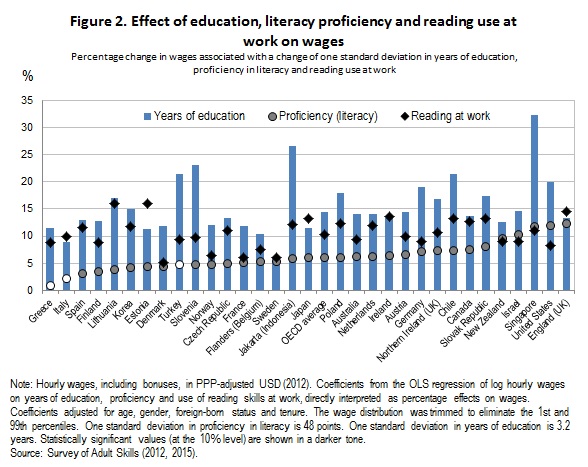
In Israel, New Zealand and Singapore, proficiency in literacy is a comparatively strong predictor of higher wages. In Chile, Jakarta (Indonesia), Singapore, Slovenia and Turkey, educational qualifications are more strongly related to wages.
Mismatch
The survey of Adult Skills provides a unique source of information on the match of workers’ skills endowments with the skills requirements of their jobs, in terms of qualifications, field of study and proficiency in literacy, numeracy and problem solving. Mismatches between skills and what is required or expected at work are found to be pervasive.
On average across OECD countries that participated in the survey, 22% of workers reported that they are overqualified – i.e. that they have higher qualifications than required to get their jobs – and 13% reported that they are underqualified for their jobs – i.e. that they have lower qualifications than required to get their jobs. Moreover, 11% have higher literacy skills than those typically required in their job, and 4% are underskilled. Some 40% of workers work in an occupation that is unrelated to their field of study (Figure 3).
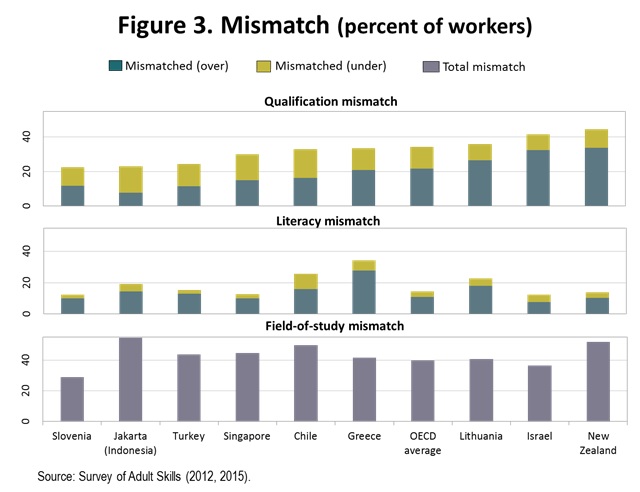
Among the countries participating in the second round of the Survey of Adult Skills, New Zealand and Israel have the highest percentage of workers who are mismatched by qualification. Skills mismatch is highest in Greece and Chile, whereas Jakarta (Indonesia) and New Zealand have the highest proportion of workers who are mismatched by field of study.
Overqualification has a significant impact on wages, even after adjusting for proficiency. Overskilling also impacts wages negatively but the size of the effect is around half that of overqualification. Mismatch by field of study does not have a strong impact on wages. Only when workers work outside their field and are overqualified do field-of-study mismatched workers suffer a significant wage penalty (Figure 4).
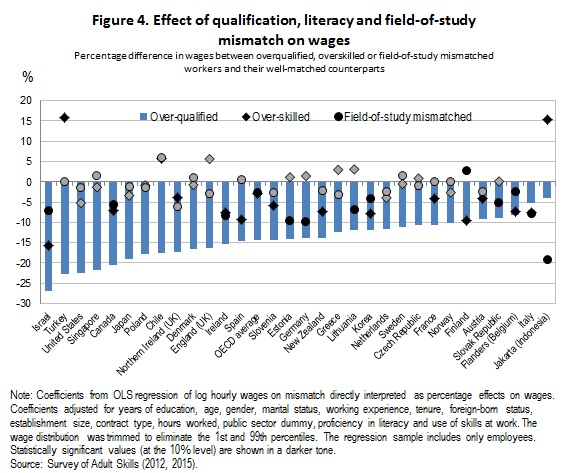
There is a wage penalty in every country participating in PIAAC for those overqualified with respect to their well-match counterparts. For Round 2 countries/economies, the highest impact is found in Israel (-27%), Turkey (-23%) and Chile (-18%), and the lowest in Jakarta (Indonesia) (-4%) followed by Lithuania (-12%). The impact of overskilling is highest in Israel (-16%), not statistically different from zero in Singapore, Chile, Greece and Lithuania, and even positive in Turkey (16%) and Jakarta (Indonesia) (15%), opposite of what is observed in most participating countries/economies. Finally, mismatch by field of study has a smaller negative impact on wages compared with overqualification and overskilling, except in Jakarta (Indonesia) where it is the most important (-19%).
Social outcomes
Proficiency in literacy, numeracy and problem solving in technology-rich environments is positively associated with other aspects of well-being. Adults who scored at lower levels of proficiency on the literacy scale were more likely than those who scored at high levels to have reported: poor health; that they have little impact on the political process; and that they do not participate in associative or volunteer activities. Individuals with lower proficiency were also more likely than those with higher proficiency to have reported less trust in others.
As an example, if we compare the self-reported social outcomes of those with high proficiency in literacy to those with low proficiency skills, New Zealand has the highest impact of proficiency in literacy on the level of trust in others, political efficacy (to believe they can influence the political process) and participation in volunteer activities. However, the impact of literacy on self-reported high level of health is well below OECD average. Slovenia has the lowest difference in political efficacy between high skilled and low skilled, whereas the impact on self-reported health is the highest among Round 2 countries/economies participating in PIAAC (Figure 5).
The results, which focus primarily on literacy proficiency, suggest that, over and above investments in education and training, improvements in adults’ proficiency in information-processing skills may provide significant economic and social returns for individuals and society. Adults’ proficiency can be improved through formal schooling, programmes for adults with poor literacy and numeracy skills or with limited familiarity with ICTs, training in the workplace, and better use of skills in and outside of work.

